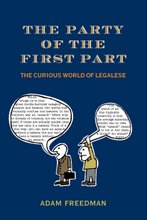A couple weeks ago, Chicagoan Arthur Friedman won a verdict of $4,802 for
alienation of affections.
In plain English, that means he sued a man for stealing his wife's heart. Proving - as if more proof were needed - that for every grievance, there's a lawsuit just waiting to be filed.
Alienation of affections is an old-fashioned term, but then virtually all legal terms concerning sexual conduct have an archaic ring to them. Various states continue to recognize laws prohibiting
fornication,
seduction,
solicitation of chastity, and
criminal conversation - not to mention
sodomy and
buggery (although very little of those laws remain following the Supreme Court's decision in Lawrence v. Texas).
In this context,
alienation does not refer to the existential estrangement that they talk about in college philosophy courses. In legal language, “to alienate” means to transfer one’s property, a usage that dates to the fifteenth century. Over time, lawyers developed a metaphorical sense of alienation, meaning the transfer of, or taking of, any possession, even intangible ones. That’s why the Founding Fathers described our fundamental rights as being “unalienable” – they can’t be taken away.
In a recent North Carolina lawsuit, a woman named Tamara Gilliam is demanding $20,000 from Beverly
Hutchens Corbett for seducing Gilliam's husband. Gilliam claims that Corbett is guilty not only of alienation of affections, but also of the intriguingly-named criminal conversation.
Like alienation of affections, criminal conversation (also known as "
crim. con.") is a cause of action that allows one spouse to sue a person who induces the other spouse to be unfaithful. It is actually the older of the two doctrines. Sir William Blackstone mentions the term in his Commentaries on the Laws of England (1765-69).
The “conversation” in criminal conversation refers to sexual intercourse, a sense that can be seen in Shakespeare’s Richard III, when Richard refers to Lord Hastings’ “conversation with Shore’s wife.” Of course it is not unusual for the law to preserve archaic meanings for everyday words – like using “fee” to describe an interest in real property (from fief).
The word “criminal” is also somewhat misleading in this context since
crim. con. is not a crime at all, it’s a tort (as is alienation of affections). In other words, the state cannot prosecute someone for
crim. con.; rather, the law allows private persons can sue each other. In any event, criminal here simply means “wrongful.”



